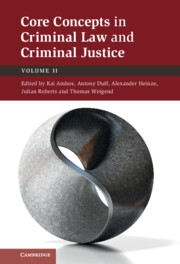Book contents
- Core Concepts in Criminal Law and Criminal Justice
- Core Concepts in Criminal Law and Criminal Justice
- Copyright page
- Contents
- About the Authors
- Abbreviations
- 1 Introduction to Volume II
- Part I Criminal Law
- Part II Criminal Procedure
- 6 Prosecutorial Discretion
- 7 Arrest and Coercion
- 8 Witness Evidence in Pre-Trial and Trial Procedure
- 9 Cooperation Agreements in Germany and the United States
- Part III Criminal Justice
- Index
- References
8 - Witness Evidence in Pre-Trial and Trial Procedure
from Part II - Criminal Procedure
Published online by Cambridge University Press: 24 February 2022
- Core Concepts in Criminal Law and Criminal Justice
- Core Concepts in Criminal Law and Criminal Justice
- Copyright page
- Contents
- About the Authors
- Abbreviations
- 1 Introduction to Volume II
- Part I Criminal Law
- Part II Criminal Procedure
- 6 Prosecutorial Discretion
- 7 Arrest and Coercion
- 8 Witness Evidence in Pre-Trial and Trial Procedure
- 9 Cooperation Agreements in Germany and the United States
- Part III Criminal Justice
- Index
- References
Summary
Witness evidence continues to occupy a central place in criminal trials. Laypersons who have witnessed crimes are called to narrate their experiences in court and experts are frequently called as witnesses to explain, interpret and justify an ever-expanding range of different types of forensic evidence collected before trial.1 Given concerns about the reliability of witness evidence, it is not surprising that it has been much discussed and is specially mentioned in the various conventions and constitutional provisions guaranteeing a fair trial.2 Much attention has focused on the different methods for controlling the manner in which such evidence is heard and challenged through the lens of the adversarial and inquisitorial categories that have long dominated and polarised comparative scholarship.3 More recently, however, it has been argued that although the methods for questioning witnesses still differ greatly, a convergence between common law and civil law systems is occurring as systems adapt towards adversarial influences and human rights requirements.4
- Type
- Chapter
- Information
- Core Concepts in Criminal Law and Criminal Justice , pp. 260 - 299Publisher: Cambridge University PressPrint publication year: 2022
References
- 1
- Cited by

